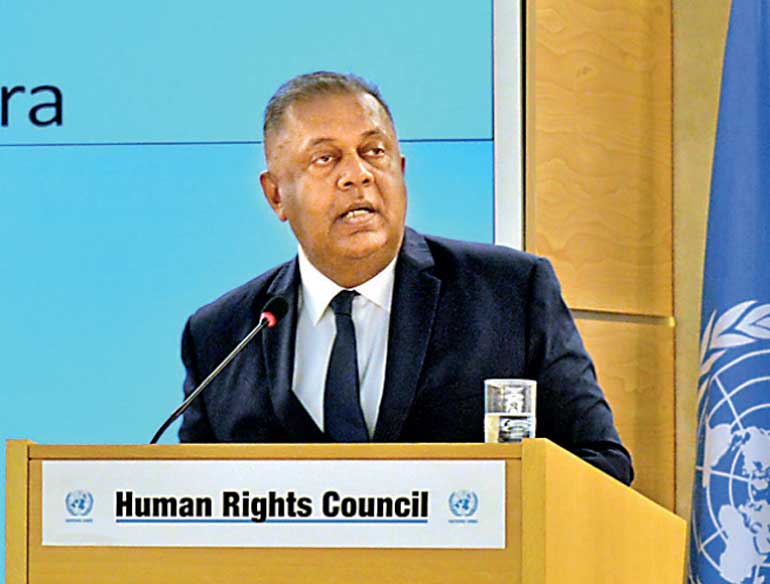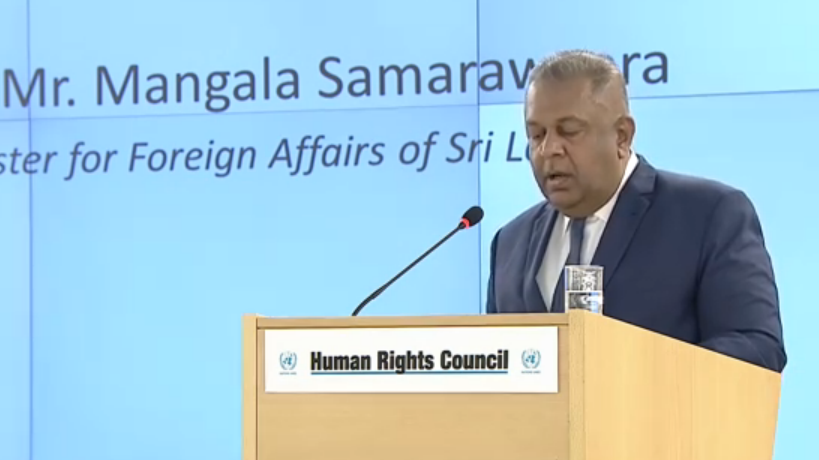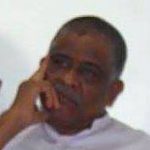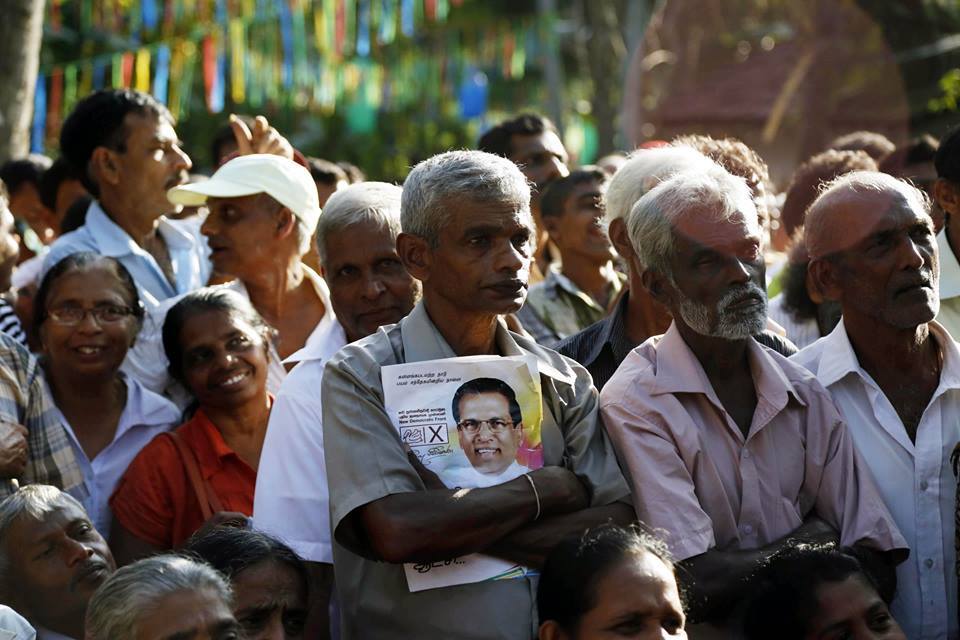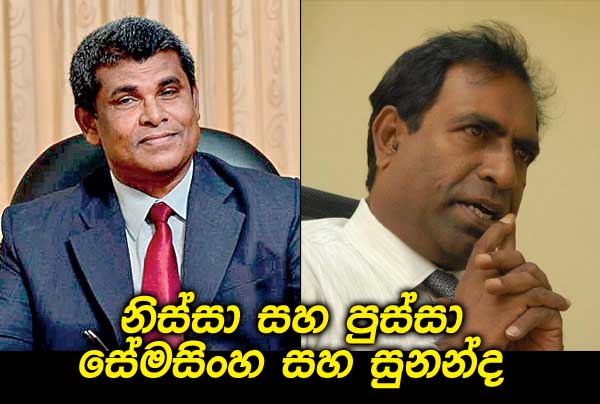Foreign Minister Mangala Samaraweera addresses the 34th UNHRC sessions in Geneva yesterday
- Amid setbacks and realpolitik considerations, the Government remains determined to follow through on its reconciliation and justice commitments, Foreign Minister tells UN in Geneva
- Mangala tells UNHRC Govt. resolve on transitional justice undiminished
- Truth-seeking Commission before Cabinet in two months
- ‘Even one incident of torture is one too many,’ says Foreign Minister
- Mangala tells UN: New constitution will ‘unite a people who have been divided too long
By Dharisha Bastians in Geneva
In the face of mounting criticism about the pace of reform and setbacks in the transitional justice process, Sri Lanka told the United Nations yesterday about dilemmas the Government was confronting as it attempted to lead a war-torn and divided country on a journey of reckoning with a violent past.
The Government of Sri Lanka was facing fire from extremists on both sides of the ethnic divide as it grapples with delivering on its reconciliation and justice pledges, but its resolve to see the transitional justice process through remains undiminished Foreign Minister Mangala Samaraweera told the UN Human Rights Council at the Palais des Nations in Geneva yesterday.
Delivering Sri Lanka’s national statement before the 47-member UN body on human rights, the Foreign Minister laid out the Government’s dilemma, as it faced accusations of doing too much or too little by different actors who stubbornly refused to acknowledge gains made in the past two years.
“In the face of roadblocks in the day-to-day world of realpolitik, there may be detours from time to time, but the destination and our resolve to walk the distance remain unchanged,” the Minister vowed.
The Government was still being criticised and accused of “treachery and betrayal” for co-sponsoring the UNHRC resolution in October 2015, Minister Samaraweera told the UN.
“As we move forward on this journey, the forces of extremism and regression on both sides of the divide are creating roadblocks for narrow, short-term gain,” the Minister told the Council during an eight-minute speech.
But the Foreign Minister said the country must have the courage to acknowledge that Sri Lanka’s first experiment in nation building after independence in 1948 had failed. “As a result for 69 long years, we journeyed through pain, violence, loss of life and precious human resources, ruining chances of socio-economic progress.”
The Government was seeking to build a different country, the Foreign Minister said, where justice reigns, human rights are valued and individual dignity is upheld. The National Unity Government seeks to engage wholeheartedly in the process to draft a new constitution that it believes is central to democratisation and preventing a recurrence of conflict, he explained.
The constitution building exercise would “unite our people who have been divided far too long,” the Foreign Minister told the council.
Outlining the Government’s steps toward reconciliation and justice, Minister Samaraweera also announced that the Truth-seeking Commission would be proposed to Cabinet for approval in two months. The truth-seeking commission, to be modelled on South Africa’s post-Apartheid Truth and Reconciliation Commission, would be the second formal mechanism to be proposed by the Government since the permanent Office of Missing Persons was enacted into law late last year.
The Sri Lankan Foreign Minister also told the UN Human Rights body that his Government believed that “even one incident of torture is one too many”, and took recent allegations of continuing incidence of torture “seriously”. “The Government maintains a zero-tolerance policy towards torture,” he claimed.
“Yet another splendid speech. We believe you, but unfortunately, your leaders President Maithripala Sirisena and Prime Minister Ranil Wickremesinghe sometimes let you down,” tweeted Suren Surendiran, Spokeperson for the Tamil Diaspora umbrella group, Global Tamil Forum (GTF) moments after the Minister’s speech.
Other Sri Lanka watchers, milling around the Palaisdes Nations after Minister Samaraweera’s speech observed that member states of the Human Rights Council would be happy with statement, since they still badly want Sri Lanka to be a “success story”.
The Foreign Minister’s speech had contained sufficient reaffirmation of the Government’s commitments to reconciliation and accountability for Sri Lanka to remain a focal point at the council, one international activist told Daily FT speaking on confidentially. “But nothing he said today indicates that the Human Rights Council should give Sri Lanka a blank cheque,” the activist warned.
During his speech, the Foreign Minister noted that since he last addressed the Human Rights Council in Geneva in June 2016, the Government had drafted legislation to outlaw enforced disappearances, formulated counter-terrorism legislative framework in keeping with international practices, enacted law to set up the OMP and given effect to Right to Information legislation.
The Human Rights Council, Minister Samaraweera was familiar with Sri Lanka’s story. “After years of denial, disengagement and self-isolation, the National Unity Government proceeded to set our country on a transformative trajectory in terms of human rights, good governance, rule of law, justice, reconciliation and economic development.”
In the face of mounting criticism about the pace of reform and setbacks in the transitional justice process, Sri Lanka told the United Nations yesterday about dilemmas the Government was confronting as it attempted to lead a war-torn and divided country on a journey of reckoning with a violent past.
The Government of Sri Lanka was facing fire from extremists on both sides of the ethnic divide as it grapples with delivering on its reconciliation and justice pledges, but its resolve to see the transitional justice process through remains undiminished Foreign Minister Mangala Samaraweera told the UN Human Rights Council at the Palais des Nations in Geneva yesterday.
Delivering Sri Lanka’s national statement before the 47-member UN body on human rights, the Foreign Minister laid out the Government’s dilemma, as it faced accusations of doing too much or too little by different actors who stubbornly refused to acknowledge gains made in the past two years.
“In the face of roadblocks in the day-to-day world of realpolitik, there may be detours from time to time, but the destination and our resolve to walk the distance remain unchanged,” the Minister vowed.
The Government was still being criticised and accused of “treachery and betrayal” for co-sponsoring the UNHRC resolution in October 2015, Minister Samaraweera told the UN.
“As we move forward on this journey, the forces of extremism and regression on both sides of the divide are creating roadblocks for narrow, short-term gain,” the Minister told the Council during an eight-minute speech.
But the Foreign Minister said the country must have the courage to acknowledge that Sri Lanka’s first experiment in nation building after independence in 1948 had failed. “As a result for 69 long years, we journeyed through pain, violence, loss of life and precious human resources, ruining chances of socio-economic progress.”
The Government was seeking to build a different country, the Foreign Minister said, where justice reigns, human rights are valued and individual dignity is upheld. The National Unity Government seeks to engage wholeheartedly in the process to draft a new constitution that it believes is central to democratisation and preventing a recurrence of conflict, he explained.
The constitution building exercise would “unite our people who have been divided far too long,” the Foreign Minister told the council.
Outlining the Government’s steps toward reconciliation and justice, Minister Samaraweera also announced that the Truth-seeking Commission would be proposed to Cabinet for approval in two months. The truth-seeking commission, to be modelled on South Africa’s post-Apartheid Truth and Reconciliation Commission, would be the second formal mechanism to be proposed by the Government since the permanent Office of Missing Persons was enacted into law late last year.
The Sri Lankan Foreign Minister also told the UN Human Rights body that his Government believed that “even one incident of torture is one too many”, and took recent allegations of continuing incidence of torture “seriously”. “The Government maintains a zero-tolerance policy towards torture,” he claimed.
“Yet another splendid speech. We believe you, but unfortunately, your leaders President Maithripala Sirisena and Prime Minister Ranil Wickremesinghe sometimes let you down,” tweeted Suren Surendiran, Spokeperson for the Tamil Diaspora umbrella group, Global Tamil Forum (GTF) moments after the Minister’s speech.
Other Sri Lanka watchers, milling around the Palaisdes Nations after Minister Samaraweera’s speech observed that member states of the Human Rights Council would be happy with statement, since they still badly want Sri Lanka to be a “success story”.
The Foreign Minister’s speech had contained sufficient reaffirmation of the Government’s commitments to reconciliation and accountability for Sri Lanka to remain a focal point at the council, one international activist told Daily FT speaking on confidentially. “But nothing he said today indicates that the Human Rights Council should give Sri Lanka a blank cheque,” the activist warned.
During his speech, the Foreign Minister noted that since he last addressed the Human Rights Council in Geneva in June 2016, the Government had drafted legislation to outlaw enforced disappearances, formulated counter-terrorism legislative framework in keeping with international practices, enacted law to set up the OMP and given effect to Right to Information legislation.
The Human Rights Council, Minister Samaraweera was familiar with Sri Lanka’s story. “After years of denial, disengagement and self-isolation, the National Unity Government proceeded to set our country on a transformative trajectory in terms of human rights, good governance, rule of law, justice, reconciliation and economic development.”

